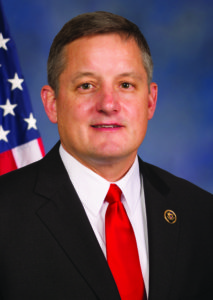Democracies require a balance between skepticism and trust. Voters must be skeptical of those they place in power, lest it be abused. But without trust, institutions can’t function democratically.
All that said, I’m erring on the side of trust this time – this time being Rep. Bruce Westerman’s Resilient Federal Forests Act.
Forestry policy is probably not an issue you’re following closely, but here’s why you should care. This year, 8.5 million acres of forestland have burned – an area four times the size of Puerto Rico. Thirty-one Californians so far have died in fires that are burning right now. The fires have destroyed homes, killed livestock, and released millions of tons of carbon into the atmosphere.
The federal government has spent a record amount this year to fight these fires, breaking the old record set in 2015. More than half the United States Forest Service’s 2016 budget of $7.1 billion was spent fighting fires rather than preventing them.
Congress’ only forester
Somebody ought to do something about this, and it probably ought to be Westerman, who is Congress’ only forester. He represents Arkansas’ 4th District, which covers large chunks of the southern and western parts of the state. Eight-six percent of the district is covered by forests, much of it managed privately (and well, he says). Before going to Washington, he worked at a Hot Springs engineering firm that specializes in the forestry industry.
Westerman says hands-off forest management methods have created vulnerable woodlands. Dead wood on the ground acts as kindling for tightly packed trees, making it easier for the flames to climb to the crowns and then spread. But regulations and the legal environment prevent the Forest Service from acting, he says.
Westerman says the Forest Service should better manage forests so it can prevent fires rather than have to fight them. So in 2015, he introduced legislation that would allow that to happen.
It didn’t pass, but he’s returned with this year’s version. The Resilient Federal Forests Act would speed up the regulatory process and allow the Forest Service to thin smaller trees, clean up the floor and use controlled burns.
Getting any bill through Congress is hard. It has already cleared two House committees but still must clear one or two others. Westerman expects the full House to pass it this month. The Senate, however, is another story. Westerman must hope the leadership there decides it’s worthy, and then it has to move all the way through the Senate. He’d like to pass it as a standalone bill, but that doesn’t happen very often these days. The other option would be folding it into a bigger disaster relief bill.
Who’s opposed to Westerman, and why
It’s opposed by environmental groups who say it would weaken government protections. One provision would end reimbursing attorneys’ fees for plaintiffs who sue the government over forest management activities. Opponents say that provision would make it harder to challenge federal actions. They say the bill would benefit the timber industry, from which Westerman has received more than $200,000 in campaign donations in his career, according to the website Open Secrets.
Westerman counters that the timber industry already has more than enough wood to harvest, and that “the forests need industry much worse than industry needs the forests right now.”
“It’s not exempting environmental regulations,” he said. “What it’s doing is creating a process that these plans can’t be tied up in a legal battle when time is of essence.”
Trust over skepticism
So should an interested citizen be skeptical or trusting of Westerman’s bill? Again, it’s always a balance, but Westerman knows this issue better than anyone in Congress. We send people to Washington from all walks of life because we trust their varied perspectives will result in better laws. Our forests are vulnerable, and Congress’ only forester says this is what we need to do.
I say we go with it, and soon. The current methods didn’t stop the burning of four times the land mass of Puerto Rico, and the deaths of 31 people.
Steve Brawner is an independent journalist in Arkansas. Email him at brawnersteve@mac.com. Follow him on Twitter at @stevebrawner.
© 2017 by Steve Brawner Communications, Inc.
